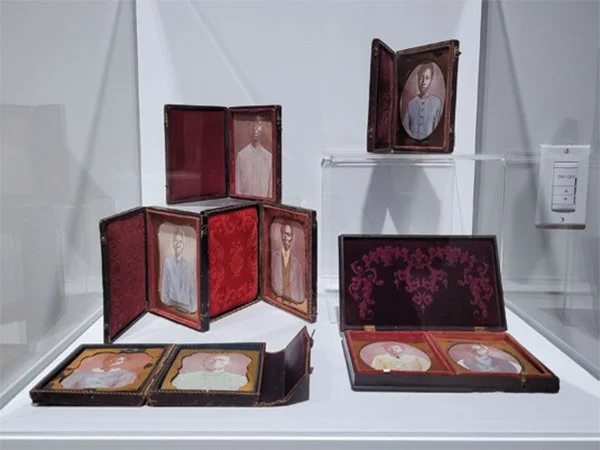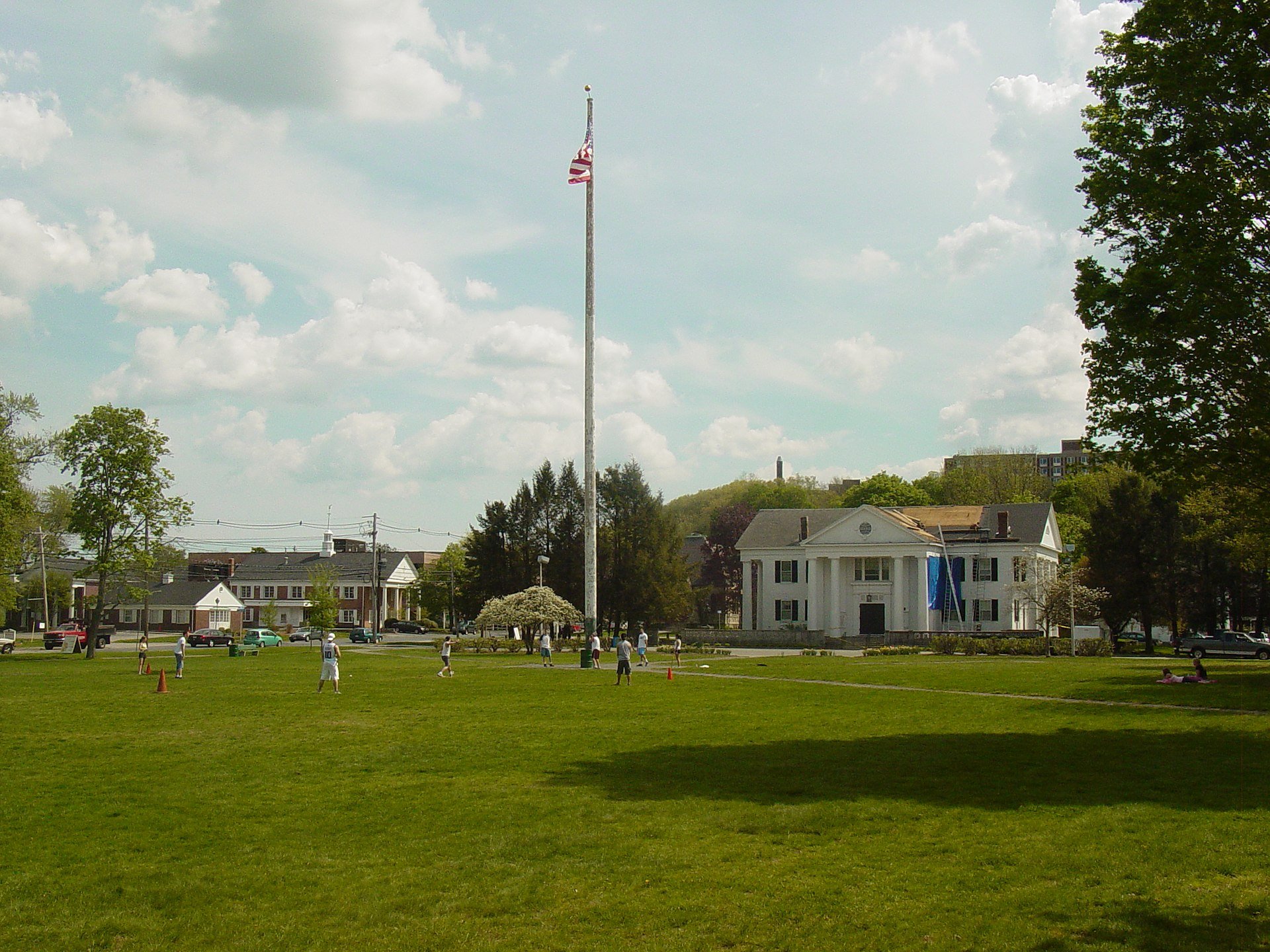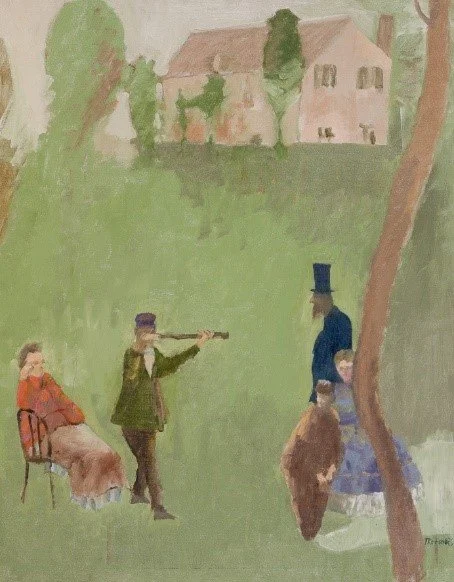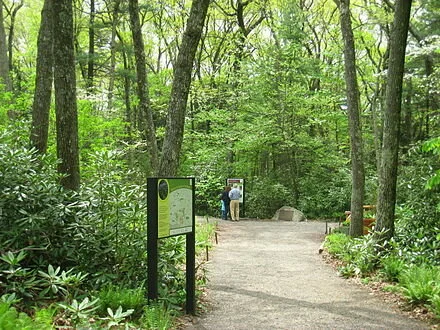
Mysteries of the past
Installation view of the show “Not a Story to Pass On,’’ of Jennifer Davis Carey and Scarlett Hoey, at the Danforth Art Museum, Framingham, Mass.
Lovely fatalism
“Amen, so be it” (oil on canvas), by Boston-based artist Jennifer Jean Okumura, at Project B Gallery, Framingham, Mass., through July 10.
Mass. city neighborhood to get geothermal heating/cooling system
Enhanced geothermal system 1: Reservoir 2: Pump house 3: Heat exchanger 4: turbine hall 5: Production well 6: Injection well 7: Hot water to district heating 8: Porous sediments 9: Observation well 10: Crystalline bedrock
“Eversource has officially begun a groundbreaking project to implement a one-of-its-kind heating system in a Framingham, Mass., neighborhood.
“This program is designed to explore whether geothermal networks can be used in combination with, or instead of, traditional energy sources like natural gas or heating oil. To test this, Eversource plans to install and operate a geothermal network in a neighborhood in Framingham, providing indoor heating and cooling to about 150 customers within the one-mile-long loop that pipes 37 buildings (32 residential, five commercial).
“‘We continue to invest in different kinds of technologies, but that’s not enough,’ said Joe Nolan, the utility’s president and chief executive officer. ‘That’s why we’re so excited to be here today around geothermal. I spend a lot of time on the road, I talk to our investors, I talk to our key decision-makers. This is one of the most exciting opportunities for me to ship now what is going on in geothermal.”’
The Common in Framingham Center
— Photo by Jerem43
#geothermal
#Eversource
#Framingham
‘Visionary Boston’
“Through a Glass Slightly” (1979), by the late Stephen Trefonides, in the show “Visionary Boston”, at the Danforth Art Museum, Framingham, Mass., Feb. 18-June 4.
The museum says:
“In the mid-twentieth century, one would not have described Boston as the center of the art world. However, despite a decades long struggle with modernism and with Abstract Expressionism gaining ground in New York, a parallel but distinct movement was stirring in New England. The relationships that flourished between painters, sculptors and photographers mid-century resulted in creative output that has shaped contemporary art in Boston into the twenty-first century.”
Can't you do better?
— Photo by Maurice van Bruggen
“What are you saying? That you want
eternal life? Are your thoughts really
as compelling as all that?…”
— From “Field of Flowers,’’ by Louise Gluck (born 1943). The winner of the Nobel Prize for Literature for her poems, she lives in Cambridge, Mass., and is writer in residence at Yale.
In Garden in the Woods, a 45-acre woodland botanical garden, at 180 Hemenway Rd., Framingham, Mass. It is the headquarters of The Native Plant Trust, and is open to visitors between April 14 and Oct. 15.
'Wonderscapes' in Framingham
“Hide and Seek” (full-room installation), by Adria Arch, in the Danforth Art Museum's (Framingham, Mass.) group exhibit, “Wonderscapes,’’ March 20-June 12
— Photo by Will Howcroft
The museum’s director, Jessica Roscio, says of the show:
“Using circles, organic forms, and undefined borders, five multi-media artists working across media create their own wonderscapes. They use the tactile nature of their materials to convey hazy, stream-of-consciousness, otherworldly dreamscapes based in reality but largely products of the mind. In focusing on elemental forms, each of these artists crafts their own narratives about time and space and the ways in which we visualize, cope, and move through our own ‘wonderscapes.’’’
Grace Kelly: Getting more Black and Brown kids out into nature
A meeting in the woods of Exeter, R.I., of students in the Movement Education Outdoors program.
— Photo by Grace Kelly for ecoRI News
EXETER, R.I.
A group of five 10th-graders tromp through a wooded path at the Canonicus Camp & Conference Center on Exeter Road. They talk about school, the platform Doc Martens they would love to have, and how New York Congresswoman Alexandria Ocasio-Cortez is great but also, it’s probably better not to idolize politicians. {Canonicus was a 17th Century Narragansett Indian chief.}
Their guide on this excursion is Joann “Jo” Ayuso, founder of Movement Education Outdoors (MEO), an organization with a mission to provide outdoor experiences for community-based organizations serving Black, Indigenous, People of Color (BIPOC) youth. She shows them nature.
“The outdoors is sacred, and yes, this land,” she said, and spreads her arms around her, gesturing at the grass and trees, “has a history of colonization, but I want us to feel welcome here. I want to invite you to make your own memories today, to decolonize this space. I introduce you to these spaces so you can own them and feel connected to the land.”
According to the National Health Foundation, while people of color make up nearly 40 percent of the population, 70 percent of the people who visit national forests, parks, and wildlife refuges are White. A mere 7 percent of national park visitors are Black.
There are many factors at play when it comes to communities of color not having the same opportunities to experience the outdoors. Ayuso said:
“I think it’s very important for people to know, that, for example, when your mom is a single parent, working three jobs, doesn’t have a car, how is she going to have time to take her kids hiking? And, unfortunately, bus lines don’t take you to any of the green space Rhode Island has to offer.”
There’s also the fact that outdoor gear is expensive, with basic equipment such as lightweight coats, hiking boots, and backpacks costing a premium.
“Equipment is always a barrier for young, low-income and urban youth,” Ayuso said. “Even having the proper layering for hiking in the fall or winter, that’s expensive.”
By starting MEO in 2018, Ayuso hopes to change this paradigm.
Ayuso’s journey from being born into poverty to being an outdoor educator for BIPOC youth started in the forests of the southern wild.
“One of my very first experiences with the outdoors was in the military,” she said. Ayuso entered the military after graduating from Joseph P. Keefe Technical High School, in Framingham, Mass., prompted in part by her brother who had also joined, and by the desire to work her way up in the world. While military service didn’t prove to be her dream, it was how she discovered her love of nature.
“One of the things I loved about the military was being outdoors, just hiking, having my rucksack on and just hiking for hours,” said Ayuso, who served in the Army in 1989-1996. “To this day, I can still remember smelling the eucalyptus trees in the South, and also smelling the pine trees when we would do our training early in the morning. It was just something that really helped me pass time, and that was one of the most memorable times of me experiencing the outdoors.”
Ayuso would come back to that moment years later, and it would be part of a series of experiences that would inspire her to create an organization to bring Black and Brown youth into nature.
In the years that filled her life between the military and MEO, Ayuso built a personal-training business in Wellesley, Mass., and left it, started a new life in Providence, learned she loved working with young people, began practicing mindfulness, and discovered her ancestral roots in Puerto Rico and West Africa.
But it was when she was hit by a car two years ago outside her Providence home and spent six months healing that she started to unravel what she wanted to do with her life.
“I had six weeks of recovery, and in those six weeks I was like, ‘I’ve gotta do something different,’” said the 48-year-old. “My partner and I just got to talking about what is it that you want to do for the rest of your life? What is it that you think you will enjoy?”
Her partner asked her to reflect on the past 15 years and think about the things she really loved.
“And I thought, ‘Damn, I really loved that time in the military when I was hiking. That was awesome.’ I felt like that was healing, that kept my mind kind of straight,” Ayuso recalled. “So my hiking experience in the military, the mindfulness training that I’ve had in the last 20 years, the Native and Black history I learned for myself, and seeing the environmental justice and climate change on Black and Brown bodies, that became the four pillars of Movement Education Outdoors.”
MEO partners with local schools such as Nowell Leadership Academy, in Providence, and such nonprofits as Riverzedge Arts, in Woonsocket, to bring underserved youth into the outdoors and to help them reflect on who they are and where they come from.
And on this chilly fall day in Exeter, the students are loving it.
As they walk through the forest of pine, oak and maple, they notice the acorns on the ground, the oak apple wasp galls tucked between fallen leaves, and learn about how beavers change the landscape to suit their needs.
They pause for a guided meditation at a bridge overlooking a pond and breathe in the cold air, watching as their breath billows around them when they exhale. They continue through the woods and stop at a rock wall to discuss the farming history of this land.
“So when the glaciers melted, they left lots of rocks here,” said a MEO intern. “And the colonizers used them to make rocks walls.”
Ayuso noted that these rock walls delineated farming property, and that between 1636 and 1750, South County farmers turned from enslaving Indigenous people to enslaving thousands of Blacks from Africa to make their farms into plantations comparable to those in the South.
The group continues onward and upward, heading to a steep incline and making their way to an overlook known as “The Pinnacle.”
The students pause at a large boulder, resting weary Converse-clad feet and shooting the breeze. Ayuso then asks them what made them want to be outside, how they came to be here. One said:
“I was a city person, but when I went on my first camping experience, it opened my eyes. I was so against it at first, but when I go on these trips, I’m so happy.”
Another student reminisced about her first time camping and how waking up outside was so special.
“The last time we went camping, my friend and I woke up at 5 a.m., and waking up to the morning dew, the smell of morning dew … it was so nice,” she said.
“It’s a break from the city, life with social media, everything feeling so controlled … when you’re outdoors, you’re on your own,” another student added.
Ayuso smiled as the group continued their discussion about life, nature, and what the future holds.
“Ya’ll are gonna make me cry,” Ayuso said, laughing. “You’re making me feel all the feels. I’m blessed to be here, to be able to do this.”
Grace Kelly is a journalist for ecoRI News.
'Journey through creation'
“Fossil 283, 2015” (archival pigment print),. by Boston-based Katherine Gulla, in her show “Passage,’’ at the Danforth Art Museum, at Framingham (Mass.) State University, through Feb. 28
Katherine Gulla's show is about her three series “Path,’’ “Falling’’ and “Fossil.’’ The museum says that these series represent, respectably, “the process, trials and remains of the artist's journey through creation. Her work is subtle and meditative, quietly reflecting nature's response to climate change and using it to bring forth feelings of absence and loss.’’
The Common in Framingham Center
Flowing from Framingham
A typical flow battery has two tanks of liquids that are pumped past a membrane held between two electrodes.
From Robert Whitcomb’s “Digital Diary,’’ in GoLocal24.com
We in the Northeast tend to be more enthusiastic about renewable energy than most Americans, in part because we tend to be more educated, including about global warming, and also because there’s no fossil fuel to be extracted in our region. But a big hurdle is boosting the capacity to store energy from solar- and wind-power facilities.
And so it was good to hear that Framingham, Mass.-based Ameresco has completed Phase 1 of Defense Department-funded research on flow battery technology as an alternative to lithium ion batteries, which degrade over time. The hope is that flow batteries may be more efficient than lithium ones and thus reduce the need for, say, diesel generators (with their pollution) used in microgrids. These new batteries might also cut utility bills.
New England still makes (expensive) things
Bright red locates Framingham
From The New England Council (newenglandcouncil.com)
“Sanofi opened the doors of its 100,000-square-foot digital bio-manufacturing facility in Framingham, Mass., on Oct. 15. The French drug-manufacturing company is one of Massachusetts’s largest life-science employers.
Sanofi’s new facility is among the first digitally enabled continuous manufacturing sites, making the building itself about a fifth the size of traditional facilities {in the sector}. The new building features state-of-the-art technology that connects the production process with research and development to better improve the commercialization of important medicines. The acceleration of their production capabilities is a key pillar in Sanofi’s ambition to establish “the gold standard in the bio-pharmaceutical industry.”
“‘We have been investing for some years to prepare for Sanofi’s future. Our Framingham facility leads the way in delivering the next generation of biologics manufacturing, leveraging intensified, continuous processing in a fully integrated digitally powered facility,’ said Philippe Luscan, executive vice president for global industrial affairs at Sanofi. ‘This opening demonstrates we are at the leading edge of innovation and manufacturing excellence, helping us to shape the future of both our company and the industry.”’
Garden in the Woods, overseen by the New England Wild Flower Society, features the largest landscaped collection of native wildflowers in New England. It is in Framingham’s Nobscot section, off Hemenway Road.













